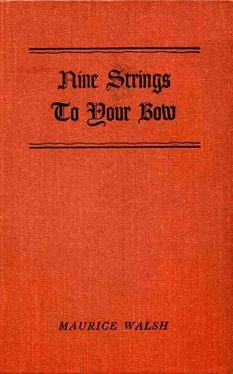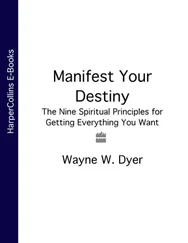Maurice Walsh - Nine Strings to your Bow
Здесь есть возможность читать онлайн «Maurice Walsh - Nine Strings to your Bow» — ознакомительный отрывок электронной книги совершенно бесплатно, а после прочтения отрывка купить полную версию. В некоторых случаях можно слушать аудио, скачать через торрент в формате fb2 и присутствует краткое содержание. Жанр: unrecognised, на английском языке. Описание произведения, (предисловие) а так же отзывы посетителей доступны на портале библиотеки ЛибКат.
- Название:Nine Strings to your Bow
- Автор:
- Жанр:
- Год:неизвестен
- ISBN:нет данных
- Рейтинг книги:4 / 5. Голосов: 1
-
Избранное:Добавить в избранное
- Отзывы:
-
Ваша оценка:
- 80
- 1
- 2
- 3
- 4
- 5
Nine Strings to your Bow: краткое содержание, описание и аннотация
Предлагаем к чтению аннотацию, описание, краткое содержание или предисловие (зависит от того, что написал сам автор книги «Nine Strings to your Bow»). Если вы не нашли необходимую информацию о книге — напишите в комментариях, мы постараемся отыскать её.
Nine Strings to your Bow — читать онлайн ознакомительный отрывок
Ниже представлен текст книги, разбитый по страницам. Система сохранения места последней прочитанной страницы, позволяет с удобством читать онлайн бесплатно книгу «Nine Strings to your Bow», без необходимости каждый раз заново искать на чём Вы остановились. Поставьте закладку, и сможете в любой момент перейти на страницу, на которой закончили чтение.
Интервал:
Закладка:
1 – CON MADDEN ESSAYS TO SELL DANIEL GLOVER
I
THE tall man slouched along the pavement, and, though he moved lazily, his gait gave a sense of controlled power. He was bareheaded under the forenoon sun of early June, and his thick light hair was thrown off his brow in a cow’s lick. He was smoking a cigarette and smoking it too rapidly, and cursing warmly underneath his breath.
“Blast you, Daniel! ‘Make contact. Sell yourself.’ Just like that, my gallant strategist! But how the bloody wars am I going to begin?”
The man he was wanting to contact was strolling leisurely twenty yards ahead. A young man, lathily but wirily built, wearing a plaid jacket over flannels. He did not seem to have a care in the world. But his face was too thin, his cheeks too hollow, and his pallor implied that he had long been hidden away from the sun.
“You’re game, you’re game, Peter lad,” said Con Madden as Peter Falkner swerved to the edge of the pavement, and looked up over the tall city houses into the blue abyss of sky where white cloud islands were drifting.
Con Madden, pausing to light a cigarette, remembered The Ballad of Reading Gaol:
I never saw a man who looked with such a wistful eye
Upon that little tent of blue which prisoners call the sky.
Peter Falkner had stepped down from the dock, a free man, only half an hour ago. The nolle prosequi proceedings had not taken five minutes. Two days ago the court had been packed by spectators avid to see a man in the toils: to-day only half a dozen saw him released. Con Madden was one who saw Peter Falkner walk out of court. And walk out alone. That fact disturbed Con. At least two of his friends should have been there to greet him: Hughes Everitt and Barbara Aitken. That they were not there might be Peter’s own wish, and it might imply that he intended slipping away somewhere—perhaps out of the country.
Con started to curse again, and then cheered up. If Falkner did slip out of the country that finished the case, and Con had never liked the looks of it. There were too many loose strings to be tied.
Con paused on the pavement to relight his cigarette, as Peter turned and entered a tobacconist’s at the corner.
Peter came out of the shop, a new corncob pipe in his teeth and a blue tin of American Cavendish in his hand. He stood at the street corner and slowly ground a brown flake between broad palms, and the eyes that surveyed the press of business men and idlers were cool and challenging. No one took the least notice of him, and that surprised Con, for Peter’s name had been in the mouths of men these many days.
A swinging sign a few doors down the side street caught Peter Falkner’s eye. He walked down towards it, and pushed through a swing door.
“Bydam’,” said Con Madden. “My own favourite caravanserai!”
It was eleven o’clock in the forenoon, the low-water hour in the liquor trade. All the partitioned alcoves along the mahogany counter, except the last one, were empty. Con Madden, coming through the swing door, saw beyond the inner edge of the partition a strong white hand—a hand too white for its bony strength—reach for a silver tankard. Con slip-footed along the terrazzo floor and anchored himself on a high stool in the last alcove but one. The barman leaning against the inside arch leading to the lounge bestirred himself, and grinned a welcome.
“You’re early this morning, Mr. Madden. A minute earlier and you’d be having the first one of the day on the house.”
The barman caressed a lever and a pint of porter frothed creamily. He knew Con Madden and his profession, and was considering a subject for a chat during the slack hour.
“Did you take a look in at Greenal Street last week, Mr. Madden—the big murder trial? They say he was a tough-looking guy, the Falkner man, and a Yank besides.”
“They, whoever they are, are damn bad judges of character, Michael,” said Con. “He is a Canadian of one generation, and he may be tough, but he certainly did not look tough. I saw him at his second trial.” Con’s voice had a considering note. “No! he’s not tough, but he’s the sort of man you’d like to have with you and not against you.”
The barman laughed. “I wonder, now, did he do the old uncle in?”
“How would I know? But if Falkner did not, the man that did fell over himself in trying to frame someone.”
“How so?”
“By making his clues too palpable—too easy. A pig-headed policeman fell for them, but three juries did not. Falkner’s clean off but with a string tied to him, a marked man all his days.”
“I wouldn’t like to be the swine that framed him.”
“How is Falkner to lay hands on him, Michael?”
“I’d search for him under the bloody mountains.”
“Would you now, Michael?” Con pointed a finger at him. “Just put yourself in his place. What would you do?”
“What would I do?” Michael scratched the back of his head. “That’s another question altogether. What would I do?” Then he grinned. “There was a bit of money going?”
“Oodles of it.”
“All I’d ask for is one month to gather me resources, and then I’d be like a needle in a bundle o’ hay.”
“You’d clear out of the country?”
“Fast an’ far an’ with a new handle—an’ that’s what I’d whisper in the Falkner lad’s ear if I got the chance.”
“And you might be whispering in a deaf ear, Michael. I had a good look at him, and he struck me as a man who would not back down or run for shelter.”
“What’ll he do then?”
“One of two things, and I’ll put half a dollar on it. If he’s not guilty he’ll do his damndest to put one over on the police by hounding out the man—or woman—that framed him.”
“And if he is guilty?”
“Then, he will lie low and say nuffin. And yet, you were right, Michael. The thing for him to do, guilty or innocent, is get away and change his identity. The year he has been in prison has wiped out every trail. No man can live under a cloud all his days—more especially if he is guiltless. He must either get out, or get inside a hard shell and die in a corner of it after eating his heart out. Anyone in the lounge?”
“Nary the one.”
“Is that the Sporting Times you have over there? Thanks. Bring me in another pint, and I’ll give you a winner later on.”
II
Peter Falkner at the other side of the partition had sat very quietly, and Con wondered if the seed he was scattering was falling on barren ground.
He picked up the sporting paper and went through into the lounge to the far corner and opened his paper, without a glance at the man in the last alcove.
Presently the barman came in with a fresh tankard and slipped it across the table. Con murmured, “Thank you, Mike!” and Mike moved back into the bar.
Con looked at the paper with unseeing eyes, but his ears and his mind were intent. The lounge door opened and closed again; slow footsteps moved across amongst the small tables and halted before Con’s; Con lifted casual eyes and looked into the eyes of Peter Falkner; and Peter Falkner’s eyes were amused and mocking and hard. He took the corncob pipe from between his teeth and pointed it at Con.
“You know who I am?” It was hardly a question. “I saw you in court this morning.”
“You are observant, Mr. Falkner,” Con said calmly. “I never caught your eye. Won’t you sit down and have a drink with me?”
Mr. Falkner did not sit down, and ignored the invitation to drink. He leaned one large, too-white hand on the table edge.
“You followed me in here?”
“I saw you come in.” Con was as calm as a post.
“You were talking at me out there with that Irish Michael?”
Читать дальшеИнтервал:
Закладка:
Похожие книги на «Nine Strings to your Bow»
Представляем Вашему вниманию похожие книги на «Nine Strings to your Bow» списком для выбора. Мы отобрали схожую по названию и смыслу литературу в надежде предоставить читателям больше вариантов отыскать новые, интересные, ещё непрочитанные произведения.
Обсуждение, отзывы о книге «Nine Strings to your Bow» и просто собственные мнения читателей. Оставьте ваши комментарии, напишите, что Вы думаете о произведении, его смысле или главных героях. Укажите что конкретно понравилось, а что нет, и почему Вы так считаете.












